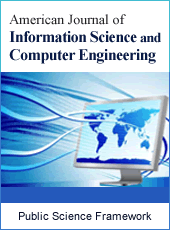American Journal of Information Science and Computer Engineering
Articles Information
American Journal of Information Science and Computer Engineering, Vol.3, No.5, Sep. 2017, Pub. Date: Sep. 18, 2017
An Estimation of Distribution Algorithm Utilizing Opposition-Based Learning for Nonlinear Blind Sources Separation
Pages: 64-70 Views: 2428 Downloads: 683
[01]
Ying Gao, Department of Computer Science and Technology, Guangzhou University, Guangzhou, P.R. of China.
[02]
Waixi Li, School of Mechanical and Electric Engineering, Guangzhou University, Guangzhou, P.R. of China.
An estimation of distribution algorithm utilizing opposition-based learning is firstly proposed in this paper. In the proposed algorithm, opposite population is generated from the current population by calculating opposite numbers, and the best individuals in the population with the current population and the opposite population are selected to form the next population based on fitness values. Then, demixing system of the blind sources separation with post-nonlinear mixture is modeled using a multi-input multi-output wavelet neural network whose parameters can be determined under the criterion of independence of its outputs. A criterion of independence based on higher order moments is used to measure the statistical dependence of the outputs of the demixing system, and the proposed algorithm is utilized to minimize the criterion. Finally, the proposed algorithm is compared with the version of the original estimation of distribution algorithm on some well-known benchmarks, and used to a post-nonlinear blind sources separation problem with two independent random signals. The relative experimental results demonstrate that the algorithm outperforms the original estimation of distribution algorithm, and is effective for post-nonlinear blind source separation.
Estimation of Distribution Algorithm, Oposition Based Learning, Nonlinear Blind Sources Separation
[01]
Jordi Solé-Casals, Cesar F. Caiafa A Fast Gradient Approximation for Nonlinear Blind Signal Processing, Cognitive Computation, 2013, 5 (4): 483-492.
[02]
Leonardo Tomazeli Duarte, Christian Jutten, SaÏd Moussaoui. A Bayesian Nonlinear Source Separation Method for Smart Ion-Selective Electrode Arrays. IEEE Sensors Journal. 2009, 9 (12), 1763-1771.
[03]
Amit Singer, Ronald R. Coifman. Non-linear independent component analysis with diffusion maps. Applied and Computational Harmonic Analysis. 2008, 25 (2): 226-239.
[04]
David N. Levin. Performing Nonlinear Blind Source Separation with Signal Invariants. IEEE Transactions on Signal Processing, 2010, 58 (4): 2131-2140.
[05]
David N. Levin. Model-Independent Method of Nonlinear Blind Source Separation. International Conference on Latent Variable Analysis & Signal Separation, 2017: 310-319.
[06]
H Sprekeler, T Zito, L Wiskott. An Extension of Slow Feature Analysis for Nonlinear Blind Source Separation, Journal of Machine Learning Research, 2014, 15 (3): 921-947.
[07]
B Ehsandoust, M Babaie-Zadeh, C Jutten, Blind Source Separation in Nonlinear Mixture for Colored Sources Using Signal Derivatives, Springer International Publishing, 2015, 9237: 193-200.
[08]
B Ehsandoust, B Rivet, C Jutten, M Babaie-Zadeh, Nonlinear blind source separation for sparse sources, European Signal Processing Conference, 2016: 1583- 1587.
[09]
P. Larranraga, J. A. Lozano, Estimation of Distribution Algorithms: A New Tool for Evolutionary Computation, Genetic Algorithms & Evolutionary Computation, 2002, 64 (5): 454-468.
[10]
Pelikan, M., Hierarchical Bayesian Optimization Algorithm: Toward a New Generation of Evolutionary Algorithms, Springer, 2005.
[11]
BV Ha, P Pirinoli, RE Zich, M Mussetta, F Grimaccia, Modified bayesian optimization algorithm for sparse linear antenna design, Progress in Electromagnetics Research B, 2013, 54 (54): 385-405.
[12]
BV Ha, RE Zich, P Pirinoli, SV Hum, Application of Modified Bayesian Optimization Algorithm to the design of reflectarray antenna, International Conference on Numerical Electromagnetic Modeling & Optimization for Rf, 2014: 1-4.
[13]
S. Shakya. DEUM: A Framework for an Estimation of Distribution Algorithm based on Markov Random Fields. PhD thesis, The Robert Gordon University, Aberdeen, UK, April 2006.
[14]
X Hao, J Tian, HW Lin, T Murata, An Effective Markov Random Fields based Estimation of Distribution Algorithm and Scheduling of Flexible Job Shop Problem, Ieej Transactions on Electronics Information & Systems, 2014, 134 (6): 796-805
[15]
Tizhoosh, H. R.: Opposition-Based Learning: A New Scheme for Machine Intelligence. In: Int. Conf. on Computational Intelligence for Modelling Control and Automation, Vienna, Austria, vol. I, pp. 695–701 (2005).
[16]
PAN Bosman, J Grahl, D Thierens, Enhancing the Performance of Maximum–Likelihood Gaussian EDAs Using Anticipated Mean Shift, Lecture Notes in Computational Science & Engineering, 2008, 5199: 133-143.
[17]
M Nakao, T Hiroyasu, M Miki, H Yokouchi, M Yoshimi, Real-coded Estimation of Distribution Algorithm by Using Probabilistic Models with Multiple Learning Rates, Procedia Computer Science, 2011, 4 (2): 1244-1251.
[18]
S Shahraki, MRA Tutunchy, Continuous Gaussian Estimation of Distribution Algorithm, Springer Berlin Heidelberg, 2013, 8 (4): 772-775.
[19]
A. Antonios K. Alexandridis, Achilleas D. Zapranis. Wavelet neural networks: A practical guide, Neural NetworksVolume 42, June 2013, Pages 1-27.
[20]
Wang F S, Li H W, Shen Y T. An overview on nonlinear blind source separation: Theory and algorithms. Signal Processing. 2005, 21 (3): 282-288 (Chinese).
[21]
Gao Ying Xie shengli A Blind Source Separation Using Particle Swarm Optimization. IEEE 6th CAS Workshop/Symposium on Emerging Technologies, Vol. 1, 2004, 297-300.

ISSN Print: 2381-7488
ISSN Online: 2381-7496
Current Issue:
Vol. 7, Issue 3, September Submit a Manuscript Join Editorial Board Join Reviewer Team
ISSN Online: 2381-7496
Current Issue:
Vol. 7, Issue 3, September Submit a Manuscript Join Editorial Board Join Reviewer Team
| About This Journal |
| All Issues |
| Open Access |
| Indexing |
| Payment Information |
| Author Guidelines |
| Review Process |
| Publication Ethics |
| Editorial Board |
| Peer Reviewers |


